“Half of Los Angeles is coming” and Ojai hotels are scrambling
Although Ojai has been a spiritual retreat for a century, the anxieties of the material world have never been far away.
And now, as more affluent Angelenos make the 90-minute trip to this valley at the foot of Ventura County’s Topatopa Mountains, accommodations in Ojai are getting trendier and more expensive by the day.
In a proudly sleepy town whose visitor schedule was once dominated by spring Ojai Valley Tennis Tournament (founded in 1896) and summer Ojai Music Festival (founded in 1947, this year June 9-12), just about every weekend a tide of Angelenos and others fill Ojai Avenue, the main street.
It’s a welcome boost for many local entrepreneurs, but in a community that’s debated for decades about how much tourism to invite, it’s a matter of supply, demand and style.
Unlike many other booming Southern California destinations, including the great Joshua Tree, Ojai has forbidden short-term vacation rentals. And there are only 12 hotels within the city limits.
“There aren’t enough hotel rooms for people who want to be here,” said Diana Hawk, manager of the Emerald Iguana Inn. “Half of Los Angeles is coming here.”
Emerald Iguana Inn.
(Christopher Reynolds/Los Angeles Times)
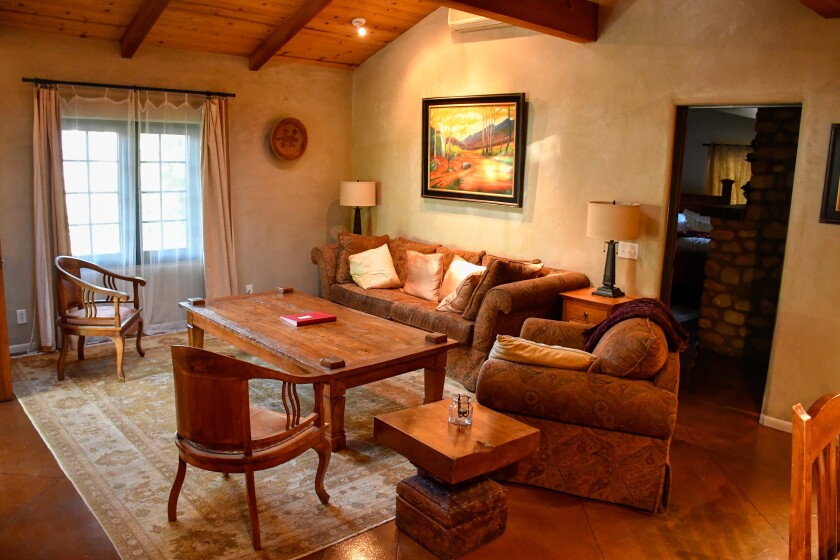
A room at Emerald Iguana Inn.
(Christopher Reynolds/Los Angeles Times)
If you can find a weekend bed in town for less than $250 per night, you’re doing better than most. If you don’t book two months in advance, you risk being excluded.
Ojai has a population of about 7,600, with about 20,000 more (and many homes) in the nearby communities of Meiners Oaks, Mira Monte, Oak View, and Casitas Springs.
The community’s spiritual inclinations date back at least to 1922, when Indian philosopher Jiddu Krishnamurti arrived as a young man (and remained, on and off, for 64 years). It’s been a getaway for people in show business for almost as long.
But national brands have effectively been banned in the city for years, so you won’t find a Hilton or a Holiday Inn or even a Motel 6.
The 306-room Ojai Valley Inn, opened in 1923, remains the city’s largest accommodation. Its 220 acres include a golf course, tennis courts and a newly renovated spa. Nightly rates start around $600, and management says bookings are “far higher” than 2019, with frequent sell-outs.
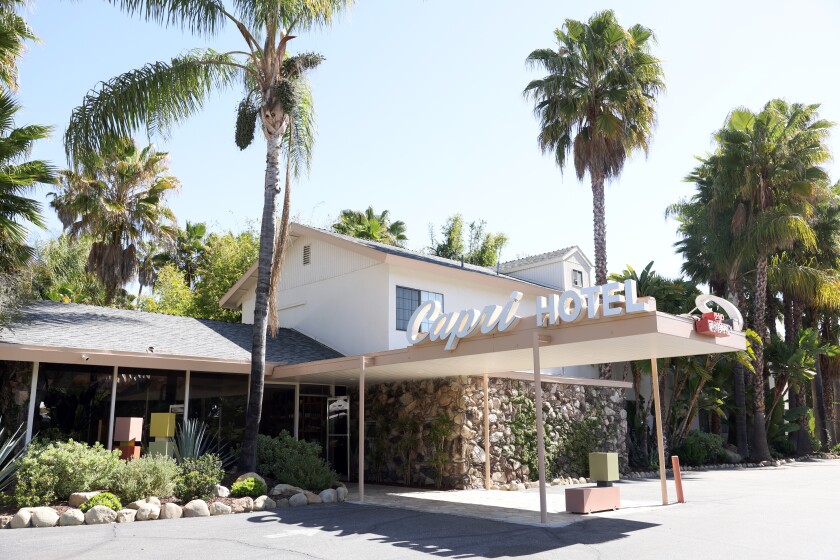
The entrance to the Hotel Capri.
(Dania Maxwell/Los Angeles Times)
Other accommodations in the area are mostly boutique hotels, including the 30 rooms Hotel Capri and 17 rooms Ojai Rancho Inn (both operated by Shelter Social Club); the 46 rooms Casa Ojai Hostel and its more expensive sibling, the 12-suite Su Nido Hostel; and the 22 rooms Chantico Inn. The 13 accommodations Emerald Iguana Inn is full of art nouveau curves and Gaudi-esque flourishes, while its sibling the 23-unit Blue Iguana Inn (about 2 miles outside of town) projects a Mexican hacienda look.
When I sat down in May to check weekend rates for these accommodations for mid-July, I found plenty of options between $300 and $500 a night, nothing below $259. Most required a minimum of two nights. Ojai in 2020 increased its hotel tax from 10% to 15%, one of the highest rates in the state.
At first glance, the quirky Caravan Outpost – 10 Airstream trailers and a small house, no swimming pool – may seem like a budget option. But the outpost’s van-life vibe and lush landscaping attract guests who regularly pay $375 a night.
For a weekend room under $250, your odds are better at Hummingbird Innthe Lavender Inn B&B (a converted schoolhouse from 1874) or one of Ojai’s retreat centers, which emphasize quiet and contemplation.
The Krishnamurti Foundation Pepper Tree Retreat (an alcohol-free, vegetarian, six-unit property with no children under 12) is one. The Ojai Retreat and Inn (12 rooms, no TV, no pets, no children under 12) is another.
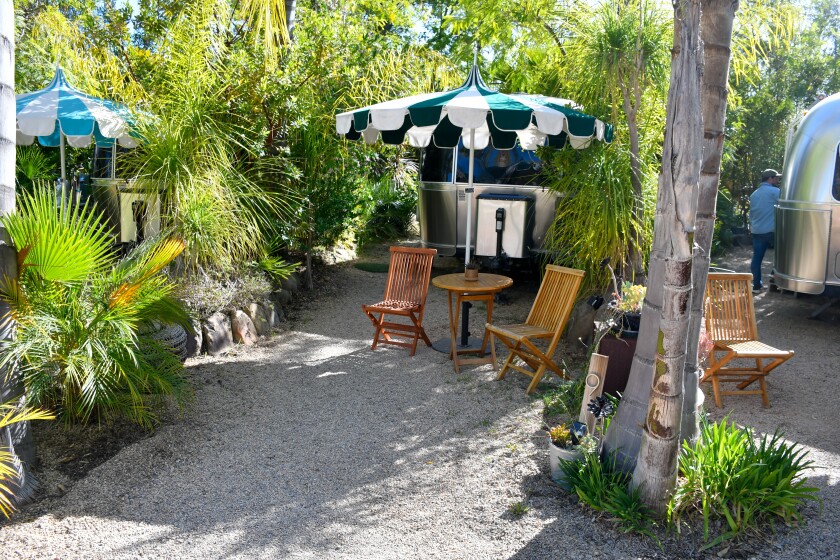
Caravan outpost.
(Christopher Reynolds/Los Angeles Times)
However, at least one big change is expected in 2024. That’s when a group of Ojai-based owners plan to complete a major renovation of the historic El Roblar Hotel (formerly known as Oaks, built in 1919 and closed since the end of 2017), which will include 50 rooms, a restaurant and a bar.
Ojai City Council approved the hotel project at a standing room only May 10 meeting despite Mayor Betsy Stix dissenting.
As for the holiday rental ban, the city council imposed it in 2016 (and filed charges against 16 alleged violators). In 2018, Ventura County banned short term rentals in the surrounding Ojai Valley, although there is an exception for “roommates” in which the owner is present in the same accommodation. Airbnb lists many properties in and around Ojai, but to legally rent you must reserve 30 days or more or use a county-approved roommate.
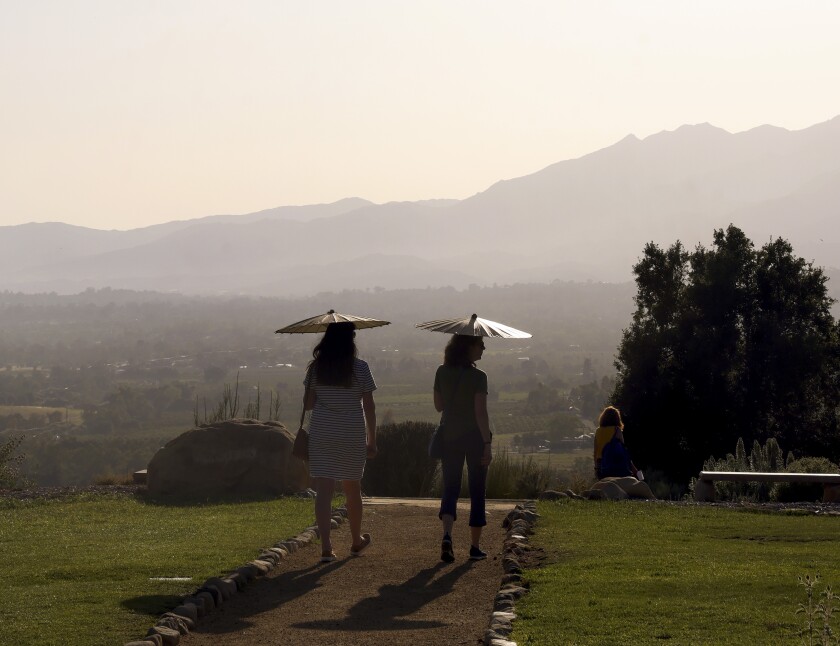
Melissa Pugh, left, and Tina Arechiga walk along a path at Meditation Mount.
(Dania Maxwell/Los Angeles Times)

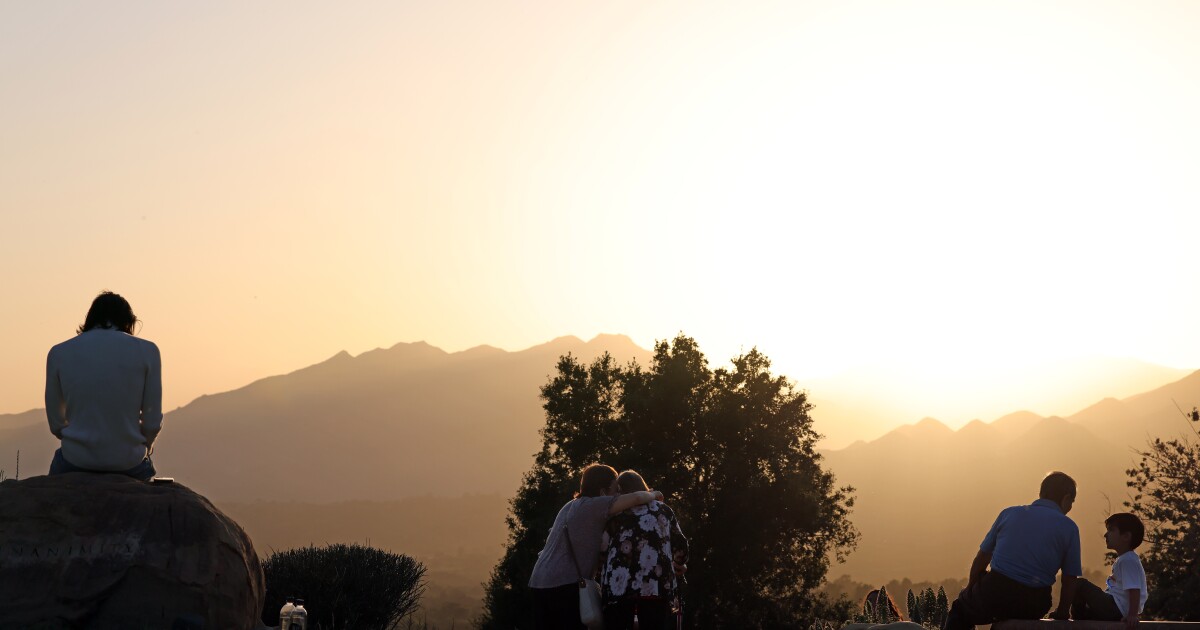
Comments are closed.